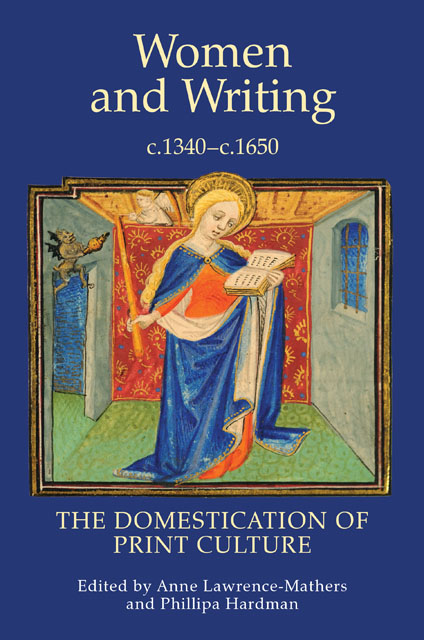Book contents
- Frontmatter
- Contents
- List of Plates
- List of Contributors
- Abbreviations
- Introduction
- Domestic Learning and Teaching: Investigating Evidence for the Role of ‘Household Miscellanies’ in Late-Medieval England
- Domesticating the Calendar: The Hours and the Almanac in Tudor England
- ‘a briefe and plaine declaration’: Lady Anne Bacon’s 1564 Translation of the Apologia Ecclesiae Anglicanae
- Frances Wolfreston’s Chaucer
- Commonplace Book Culture: A List of Sixteen Traits
- Women, Politics and Domesticity: The Scribal Publication of Lady Rich’s Letter to Elizabeth I
- ‘yr scribe can proove no nessecarye consiquence for you’?: The Social and Linguistic Implications of Joan Thynne’s using a Scribe in Letters to her Son, 1607–11
- Fathers and Daughters: Four Women and Their Family Albums of Verse
- The Book as Domestic Gift: Bodleian MS Don. C. 24
- ‘like hewen stone’: Augustine, Audience and Revision in Elizabeth Isham’s ‘Booke of Rememberance’ (c. 1639)
- Female Voices in Early Seventeenth Century Pamphlet Literature
- Select bibliography
- Index
- Misscellanious Endmatter
‘yr scribe can proove no nessecarye consiquence for you’?: The Social and Linguistic Implications of Joan Thynne’s using a Scribe in Letters to her Son, 1607–11
Published online by Cambridge University Press: 01 March 2023
- Frontmatter
- Contents
- List of Plates
- List of Contributors
- Abbreviations
- Introduction
- Domestic Learning and Teaching: Investigating Evidence for the Role of ‘Household Miscellanies’ in Late-Medieval England
- Domesticating the Calendar: The Hours and the Almanac in Tudor England
- ‘a briefe and plaine declaration’: Lady Anne Bacon’s 1564 Translation of the Apologia Ecclesiae Anglicanae
- Frances Wolfreston’s Chaucer
- Commonplace Book Culture: A List of Sixteen Traits
- Women, Politics and Domesticity: The Scribal Publication of Lady Rich’s Letter to Elizabeth I
- ‘yr scribe can proove no nessecarye consiquence for you’?: The Social and Linguistic Implications of Joan Thynne’s using a Scribe in Letters to her Son, 1607–11
- Fathers and Daughters: Four Women and Their Family Albums of Verse
- The Book as Domestic Gift: Bodleian MS Don. C. 24
- ‘like hewen stone’: Augustine, Audience and Revision in Elizabeth Isham’s ‘Booke of Rememberance’ (c. 1639)
- Female Voices in Early Seventeenth Century Pamphlet Literature
- Select bibliography
- Index
- Misscellanious Endmatter
Summary
To the Right wor
shipfull my Loving
Sonne Sir
thomas thin Long
Let gve this
wth speed
Good sonn your Leter was expeicited Longe be fore
I hard from you. which made me doutfull.
what couse your sister ??? showld take for
her mony ???? seinge you cam not acording
to your promys ^whch^ gaue both her and my selfe
much discontenment: where apon she hath
made her atornes to reseaue her the mony
to her youse: yett neuer the less. if you
will haue the hole som. all to gether for
thre weakes or ^a month^ Longer if you please. geu=
inge her what she and you shall agree a=
pon ? at your and her nexst meteinge ????
geuinge her atornes good secureite for
the hole thosen pondes. to be pade vnto her
at London or other wise ? ^where^ she shall apount
[this entire line crossed out in the manuscript]
[most of this line crossed out] but to breake
the some shee is very vnwilinge and there=
fore good sonn haue abrotherly care for her
good for that she is very wilinge you shold
haue it afore astranger for the Lone of your
house I hartely thanke you and doe take it
very kindely from you wishinge I had
??? knone your minde afore for then I wold
not atrobeled my sister kneueit as I did but
now god wilinge if it please god to sende me
any reasenabell helth I will see both you
and yours to my greate comfort for your
sonne heare he is in good health and is much
altred for the beter I prase god: I thanke
you for your sister cristen praing ^you^ that she
may haue the continunance of your Loue vnto
her and this prayeng you to beare with my scri=
blinge Leter beinge not well at this tyme beinge
very well satesfied by your Leter which I pray
god euer to kepe and bless both you and youres
remembringe my beste Loue vnto you? I rest
Taken alone, this, the last surviving letter sent from Joan Thynne to her son Thomas in 1611, affords little out of the ordinary from what we know about letter-writing practice in the early seventeenth century.
- Type
- Chapter
- Information
- Women and Writing, c. 1340-c. 1650The Domestication of Print Culture, pp. 131 - 145Publisher: Boydell & BrewerPrint publication year: 2010



